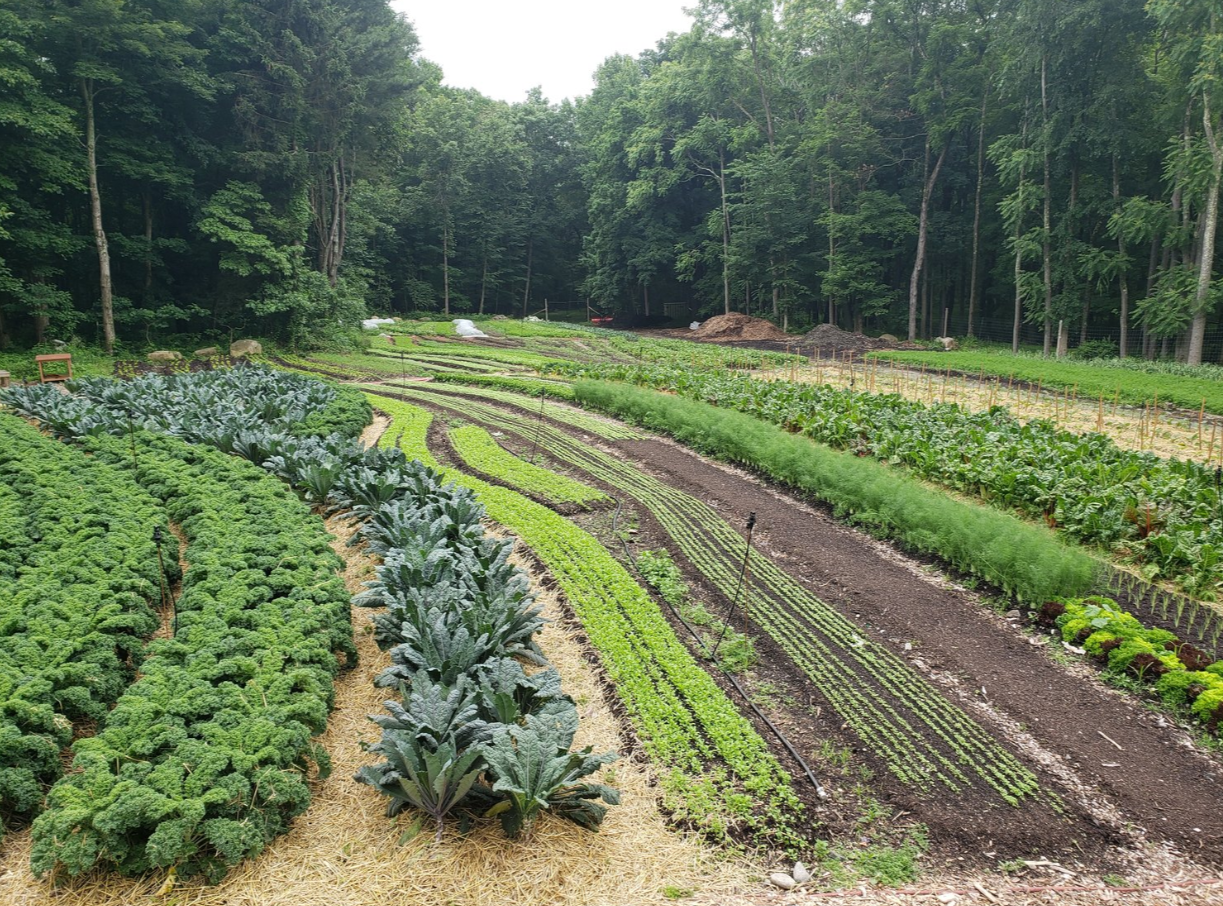

Fresh Roots Farm during the growing season. Photo: MEVO.
By Caroline Poskrobko | NJ Spark
This story was produced in collaboration with NJSpark and the New Jersey Sustainability Reporting Hub as part of the Ecology-Justice Reporting Fellowship.
In the heart of Mahwah, New Jersey, a nonprofit organization is letting young people take the reins of the environmental movement. Mahwah Environmental Volunteers Organization, or MEVO, is providing a new template for organizations seeking to make a difference. It starts with a group of high school kids.
In 2008, 16-year-old Mahwah High School student Eric Fuchs-Stengel founded a club for friends with a shared concern for the environment. They hiked and cleaned up trash on the sides of trails with other students at Mahwah High School. Soon enough, they began to dedicate their Saturdays to volunteer work, such as tree-plantings in town, clean-ups in local parks, and other environmental service projects.
When Fuchs-Stengel and his friends departed for college, the club had every reason to disband. And yet the movement continued to snowball. They started the Farm to Live program, where they grew seedlings in their dorm rooms. MEVO had been given a plot of land at Bergen County Community College, where their seedlings were able to continue flourishing.
MEVO Executive Director Violet Reed, who began as a Summer Farm Crew Intern in 2017, shared more details from MEVO’s early days.
“We also started the Stag Hill Cleanup Program, where we cleaned up over 700,000 pounds of trash on Stag Hill in Mahwah, which is home to the Ramapough Lenape Nation and everyday Mahwah residents,” she said. “So all these things were starting to brew and we began to really pick up momentum. And then we incorporated in 2011—that’s when we really became a not-for-profit.”
Today, MEVO has evolved into something much bigger than a high school club. With a stated mission “to be the model for the creation of scalable ecological solutions that inspires and empowers people to take action for a better future,” MEVO manages sustainable community farms, builds miles of low-impact hiking trails with the New York-New Jersey Trail Conference (NYNJTC), and leads efforts to combat illegal trash-dumping in the Indigenous community of the Ramapough Lenape Nation.
Since MEVO was founded in 2008, it has mobilized over 7,000 volunteers of all ages to carry out over 70,000 hours of environmental community service at over 450 environmental volunteer events in Northern New Jersey and lower New York State.
While trash cleanups and trail-building remain vital, MEVO’s efforts focus primarily on sustainable agriculture. Operating year-round on two farms, MEVO uses a variety of techniques including market gardening, permaculture, low-till practices, and biointensive growing. Fresh Roots Farm, spanning four acres within Campgaw Mountain Reservation, operates for free under a land-use agreement with Bergen County, though only one-and-a-half acres are actively farmed on. The organization’s second farm, Lovewell Farms, is nestled in the rear of a homeowner’s backyard, also at no cost. The property contains a nine-acre stretch of woodland with over an acre designated as historical farmland—rendering it ideal for agricultural purposes.
Befitting an organization founded by a local kid, produce from these farms is allocated in the community. Some of it goes to a few local restaurants, some to the Ramsey Farmers Market, and the rest is shared through the annual Community Supported Agriculture (CSA) program. As part of the CSA program, community members buy shares of the farm’s produce before the start of the season. For pledging their support and committing to the risks and rewards of farming, they receive a weekly assortment of fresh and varied produce.
The CSA program is a key revenue stream for MEVO, and a useful example of how local agriculture can thrive while staying local. Said Reed, “The primary basis of all CSA models is that the money is being provided up front and not week by week. And that acts as insurance for the farmer. So it gives us cash flow when there is no cash flow coming in.”
Of course, sustainable farming brings its own challenges—including maintaining a healthy crop of farmers. To keep its yearly momentum, MEVO has dedicated resources to a directive education program. The organization runs spring, summer, and fall internships for college-aged students who want hands-on agricultural and environmental experience. Each season brings its own set of responsibilities; in the summer, for instance, MEVO divides 12 interns between their Farm Crew and Trail Crew, where they learn about sustainable agricultural practices and ecologically sensitive management of park systems. True to its roots, the organization prioritizes young people through its programming, which includes internships, educational programs, and many volunteer opportunities that bring them closer to nature.
All these efforts serve to ensure that MEVO operates within the communities it serves. Reed pointed out that, for young people, a chance to be given responsibilities with real consequences empowers them to go out and make meaningful change elsewhere.
“Volunteers are our backbone. It’s why we’re here. We need the volunteers. And I think in a way the volunteers need us. So it’s this mutually beneficial relationship, we’re providing them with an experience and getting outdoors, exposing them to opportunities they never have,” she said. “And at the same time, all of our programs are crafted to need volunteers. We have a smaller staff than most farms do. I mean, it’s in our name—we will never not be a volunteer organization.”
Not every town or community has its own homegrown environmental organization. But MEVO’s story demonstrates that it doesn’t take seed money to plant that first seed. All you need is passion, purpose, and a genuine connection between people and place. Grassroots movements have blossomed from less.
“We feel the best way to combat environmental apathy or disconnection from the environment is through getting our community’s hands in the dirt, boots on the ground, picks in the soil—building trails, doing trash, cleanups, growing food, and just really connecting to the earth.”
